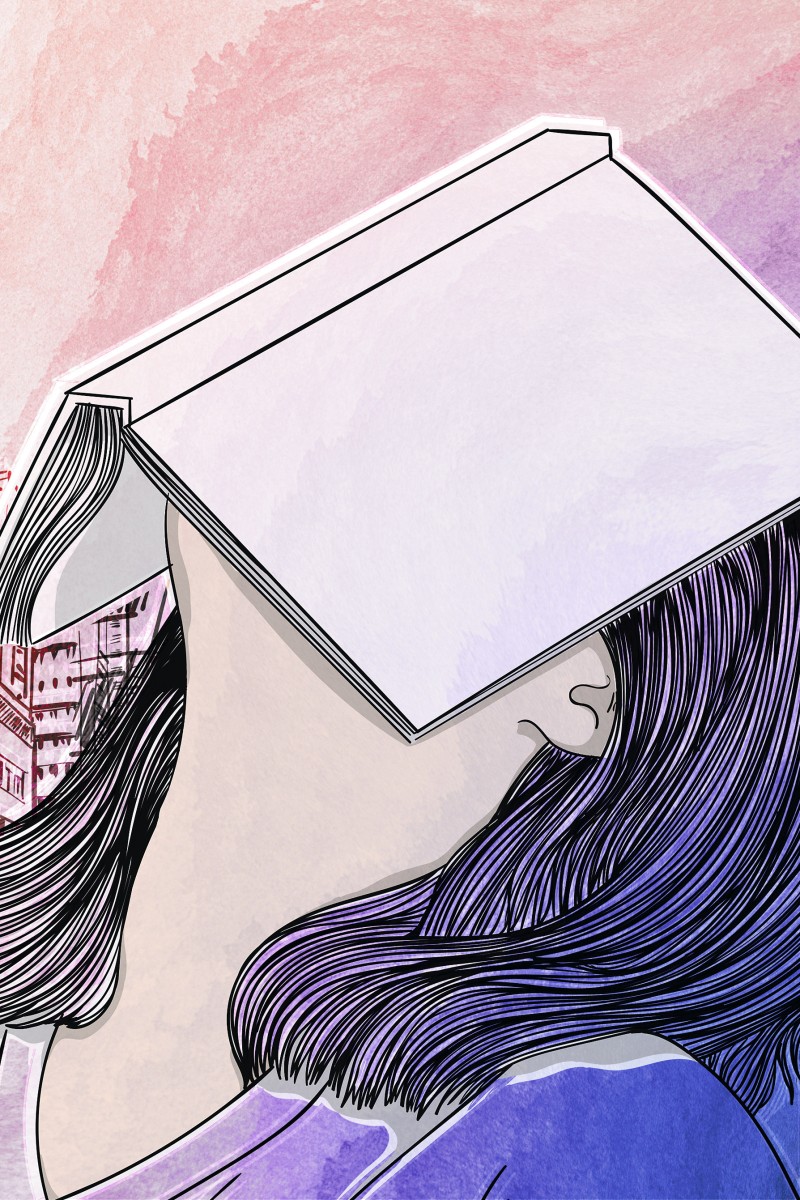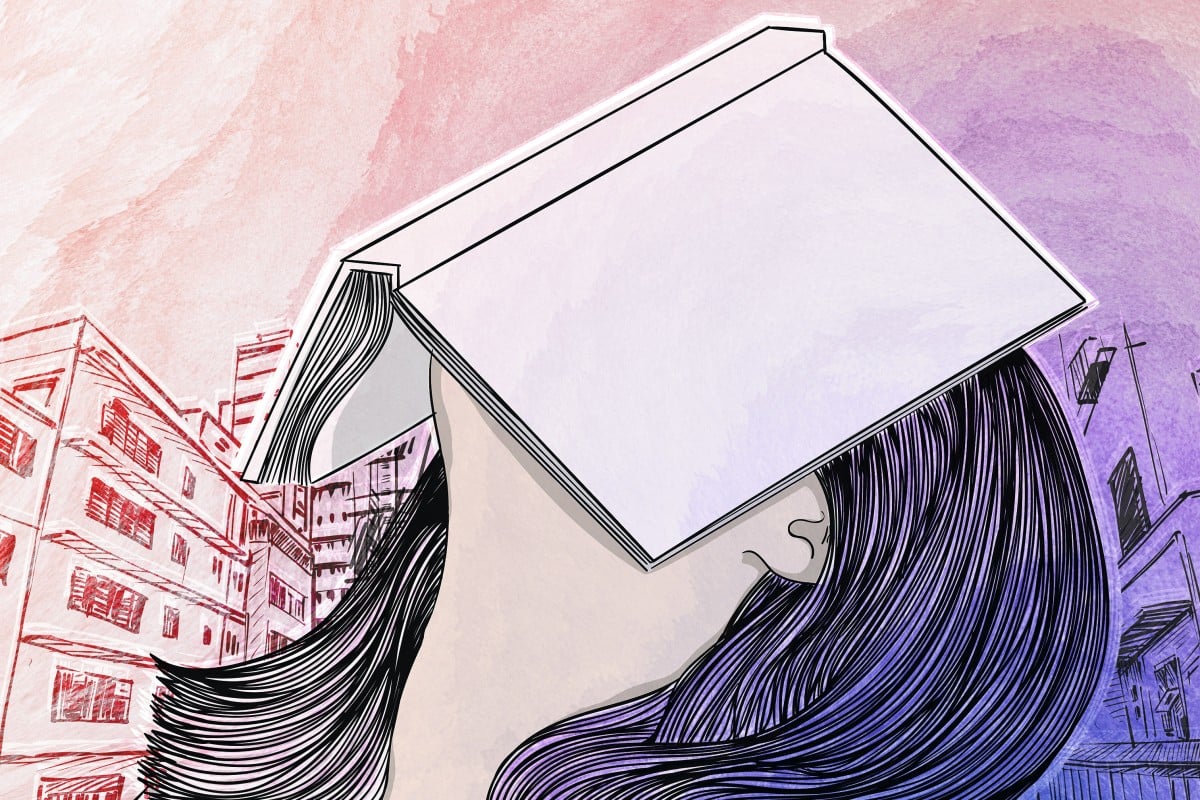
Why are Hong Kong teens ‘lying flat’? For some, it’s ‘not as stressful’
While some students are doing the bare minimum to preserve their mental health, experts say schools need to shift focus away from exams.
 “Lying flat” is when someone chooses only to do what is needed to survive. Illustration: Shutterstock
“Lying flat” is when someone chooses only to do what is needed to survive. Illustration: ShutterstockEver since Asha Lo started secondary school, she has been ignoring “optional” tasks – taking fewer tutorial classes, spending less effort on her studies and even skipping an additional section when applying to her dream exchange programme in Thailand.
“I was still lazy ... So I just lost the chance [to go to Thailand],” the 16-year-old said.
Like many other young Hongkongers, Asha describes herself as “lying flat”, a term referring to doing only the bare minimum to get by. A recent survey from the Hong Kong Young Women’s Christian Association found that nearly half of the city’s secondary school students were already lying flat or planning to do so.
“Compared to my classmates, I don’t really go to lots of tutorial classes, and I consider myself as a ‘deadline fighter’. I won’t really do a lot of extra things,” Asha said.
The teen said she was aware of the consequences of lying flat, especially after being rejected from the exchange programme. But for now, she said she preferred this lifestyle because of the benefits for her mental health.
“I feel happy knowing that it’s not as stressful as some of my friends who take extra classes for every subject,” Asha said. “At the same time, I feel kind of disappointed with my grades.”
Face Off: Are Hong Kong teenagers ‘lying flat’?
Why are teens lying flat?
When Asha was in primary school, she worked hard to score top marks. This all changed once she started attending a competitive local secondary school where she struggled to keep up with her classmates even after putting in her best efforts.
“You see the gap between you and other people ... It’s very hard to overcome this,” the teen said. “I tried to study hard for a year, but it didn’t give many positive impacts.”
This was also during the Covid-19 pandemic when students switched abruptly to online classes.
“It’s harder to absorb the knowledge from the teachers because you can’t really ask questions. So it’s hard to learn because of all these hurdles. You find [that] studying hard is useless,” said Asha, adding that “all” of her friends expressed a desire to lie flat.
Tim*, a secondary school teacher who has taught in Hong Kong for nearly eight years, agreed the pandemic contributed to the trend of lying flat as it “exacerbated” tendencies already present in these students.
“A lot of them are addicted to Korean dramas, anime [or] video games. And it only [worsened with] the pandemic because they were inside ... all day,” the educator explained.
Nearly half of Hong Kong secondary students are ‘lying flat’ or plan to, survey finds
But ultimately, he blamed the Hong Kong school system for being too competitive with a narrow focus on exam preparation.
“You’ve got overworked kids at the top [of the class] and underworked kids at the bottom,” Tim said. “At the end of the day, you’ve got a system that rewards exams and doesn’t reward soft skills.”
Ken Fung, who has been a child psychologist for 10 years, said lying flat was a response to pressure.
“Lying flat is a defence mechanism,” Fung said. “If the achievements expected by their parents or family or the society are actually out of their control ... they may adopt this lying flat strategy to avoid disappointing society.”
Fung added that this could be a way for students to protect themselves from feeling inadequate.
“When [students] fail, they can blame it on not working hard rather than their ability,” he said.
Lingnan University philosophy professor Adrian K Yee called lying flat a “form of silent protest” against how hard people have to work if they want to achieve success. He said the immense pressure of working long hours to stay afloat in Hong Kong could be overwhelming.
“It’s unsurprising that people are saying, ‘I just had enough of this ... I’m going to enjoy life,’” Yee said.
How to get back up
Rainbow Chow, who has been a career coach for more than a decade, noted that the education system needed to change its narrow approach to success, in which students are considered failures if they are not at the top of the class.
“We’re just teaching them how to fail because of the system. And I feel that the school [system] is not teaching the students how to face these failures,” Chow said.
To help pupils get back up after defeat, Chow said schools needed to shift their focus away from scores and towards developing emotional intelligence.
According to Fung, the desire to lie flat could also be a sign that students need to take a break. Instead of giving up and avoiding responsibility, the psychologist recommended doing something that brings you joy.
“Taking a break ... is actually a good thing,” he stressed. “So when you are tired, perhaps take some time [on] your own to do something ... you really enjoy doing, to see people that you like seeing, to go play some sports, to read some books that you like.”
He said serious cases of lying flat – when students have lost all motivation and feel overwhelmed and depressed – required help from a professional counsellor.
Tim also encouraged students who are lying flat to consider their future.
“If you work harder now, then you won’t have to work as hard for the rest of your life,” he noted. “If you get into a very bad job or you fail, you won’t have as many options [without a university degree].”
This is why Asha is planning to change her approach. She said students should know when lying flat was more harmful than useful.
Since she hopes to be a history teacher or archaeologist one day, she knows she needs to get into a good university. With this goal in mind, she feels ready to put in effort again as she begins preparing for her university entrance exams.
“I’d start from dropping the habit of being a couch potato and start reading the books first ... The start is the thing that stops most people,” she said.
* Name changed at interviewee’s request.
-
Stop and think: What are the benefits and consequences of lying flat according to each interviewee?
-
Why this story matters: When Hong Kong’s education system only rewards the cream of the crop, other students may feel like trying their best is useless. When addressing the trend of teens “lying flat”, schools may need to rethink their approach to success and learning.
consequences 後果
the result or outcome of an action, which is often negative
defence mechanism 防衛機制
strategies to cope with anxiety, stress of uncomfortable emotions to protect yourself
exacerbated 加劇
to make a situation much worse
immense 龐大
extremely large or vast in size or degree
inadequate 不足的
not good enough
stay afloat 維持生計
to keep from sinking, either literally (in the water) or metaphorically
